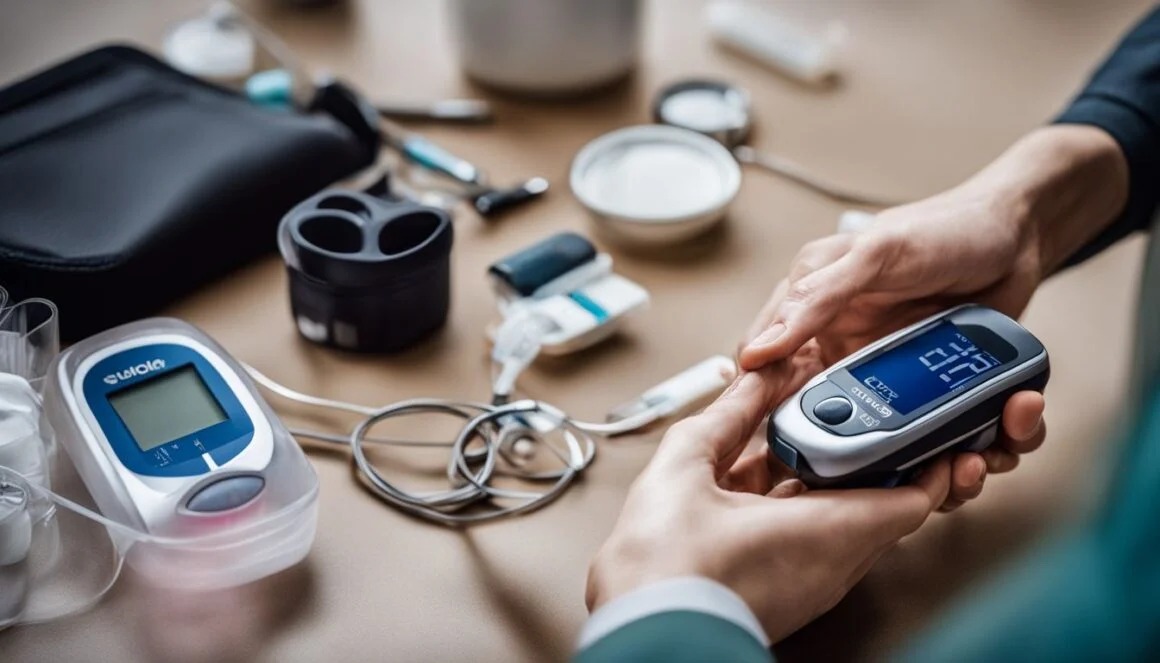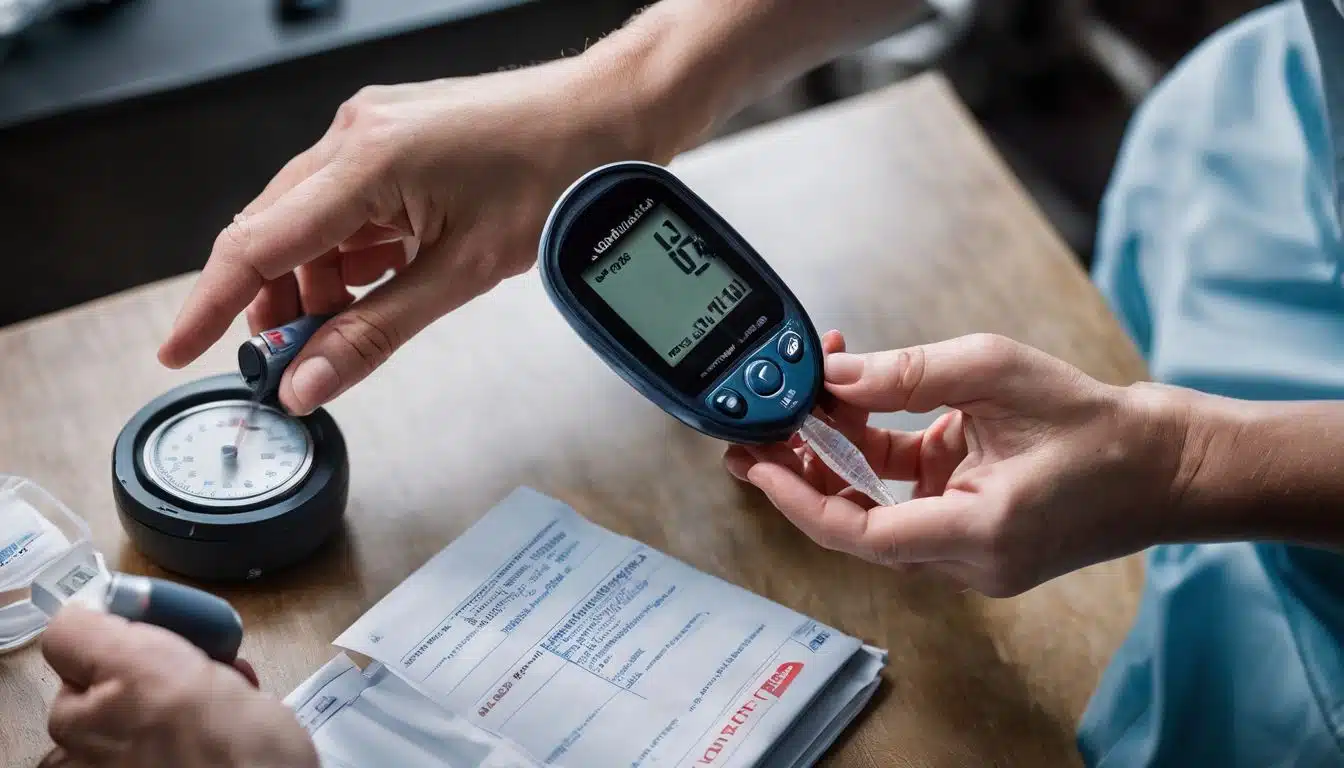Managing diabetes and controlling blood sugar levels can often seem like a real challenge. Did you know that lifestyle changes, dietary habits, and regular health check-ups play a crucial role in effective diabetes management? This blog post will provide practical effective strategies for diabetes management and blood sugar control and improve your overall well-being.
Let’s dive in and discover how you can take control of your diabetes today!
Key Takeaways
- Lifestyle changes, such as a healthy diet and regular exercise, play a crucial role in managing diabetes and controlling blood sugar levels.
- Regular monitoring of blood sugar levels is essential for effective diabetes management. This helps identify trends and make necessary adjustments to maintain control.
- Medication adherence is important for controlling blood sugar levels. Taking medications as prescribed by the doctor can help individuals with diabetes maintain stable blood sugar levels.
- Regular health check – ups are necessary for monitoring overall health and making necessary adjustments to medications, lifestyle choices, and treatment plans.
Understanding Diabetes
Diabetes is a chronic condition that affects the body’s ability to regulate blood sugar levels, resulting in high or low levels of glucose in the bloodstream.
What is Diabetes?
Diabetes is a health problem. Your body uses a sugar called glucose for energy. The hormone insulin helps your cells take in this glucose. But in diabetes, your body does not make enough insulin or can’t use it well.
This causes high levels of glucose in your blood. Bad things can happen if you leave it untreated, like heart disease and kidney problems. There are three kinds: Type 1, Type 2, and gestational diabetes which happens during pregnancy only.
The Importance Effective Strategies for Diabetes Management
Blood sugar levels need good care. Otherwise, diabetes problems start to grow. Bad diabetes can cause strokes and heart attacks. It could even make your kidneys fail or you might go blind.
Doctors say careful steps are key in fighting these bad results of high blood sugar. These include things like eating right, checking blood sugar often, and taking the correct amount of medication on time every day.
A healthy lifestyle is a powerful tool for managing diabetes well.
The Role of Lifestyle in Diabetes Management

Lifestyle plays a crucial role in managing diabetes, with factors such as diet and nutrition, physical activity, and stress management having a significant impact on blood sugar control.
Diet and Nutrition
Eating right is key for managing diabetes. You need to know what foods raise your blood sugar and how much to eat. Healthy choices include fruits, veggies, whole grains, lean proteins like fish and chicken, and low-fat dairy.
Keep portion sizes in check too. Big meals can cause high blood sugar levels. Also avoid sugary drinks like sodas or fruit juices as they can spike your sugar level quickly. Stick with water or unsweetened tea instead.
Physical Activity
Moving your body helps control diabetes. Doing things like walking or dancing makes your heart pump faster. This is called aerobic exercise. Lifting weights or doing push-ups strengthens your muscles.
You need strong muscles to use insulin better and lower blood sugar levels. Try to get active most days of the week, but take it slow at first if you haven’t exercised in a while.
Stress Management
Stress can have a big impact on managing diabetes and controlling blood sugar levels. When we’re stressed, our bodies release hormones that can cause our blood sugar to go up. By managing stress, we can help keep our blood sugar in check.
One way to manage stress is through relaxation techniques, like deep breathing or meditation. Another helpful strategy is developing coping skills, such as setting realistic goals and prioritizing tasks.
Regular exercise and getting enough sleep are also important for reducing stress.
Essential Aspects of Diabetes Management

Blood Sugar Monitoring, Medication Adherence, and Regular Health Check-ups are crucial for effective diabetes management.
Blood Sugar Monitoring
Blood sugar monitoring is an essential aspect of diabetes management. It helps you keep track of your blood sugar levels and make necessary adjustments to maintain control. Here are some key points to remember:
- Check your blood sugar regularly using a glucose meter.
- Follow the guidelines provided by your healthcare team for when and how often to monitor.
- Keep a record of your blood sugar readings to identify trends over time.
- Understand the target range for your blood sugar levels, as recommended by your doctor.
- Adjust your diet, physical activity, and medication based on your blood sugar readings.
- Be aware of the signs and symptoms of low blood sugar (hypoglycemia) and high blood sugar (hyperglycemia).
- Seek medical attention if you experience severe or persistent fluctuations in your blood sugar levels.
Medication Adherence
Taking medications as prescribed by the doctor is crucial for effectively managing diabetes and controlling blood sugar levels. This includes adhering to insulin injections or oral medications, and storing them properly.
If there are any concerns or issues with medication storage or administration, it is important to consult the doctor for guidance. Overcoming barriers to medication adherence, such as forgetting doses or experiencing side effects, can lead to improved outcomes in diabetes control.
Following the prescribed treatment plan consistently can help individuals with diabetes maintain stable blood sugar levels and prevent complications associated with high or low blood sugar.
Regular Health Check-ups
Regular health check-ups are an important part of effective diabetes management and blood sugar control. They help in monitoring blood sugar levels and making necessary adjustments to medications and lifestyle. Here are some key aspects of regular health check-ups for diabetes:
- Monitoring blood sugar levels: Regular check-ups allow for the monitoring of blood sugar levels, which helps in understanding how well the diabetes is being managed. This information can guide adjustments to medication doses or lifestyle choices.
- Assessing overall health: During check-ups, healthcare professionals can assess overall health and identify any complications related to diabetes, such as high blood pressure or kidney problems. Early detection and treatment of these issues can prevent further complications.
- Creating a personalized care plan: Healthcare professionals work with individuals to create a personalized care plan that considers their specific needs and goals. This plan may include dietary recommendations, exercise guidelines, medication adjustments, and regular follow-up appointments.
- Identifying factors that affect blood sugar levels: Regular check-ups allow for discussions about various factors that can affect blood sugar levels, such as food choices, physical activity, illness, and stress. Healthcare professionals can provide guidance on managing these factors to achieve better blood sugar control.
- Ensuring proper medication storage: Check-ups provide an opportunity to discuss proper storage of diabetes medications, including insulin. This ensures that medications remain effective and any storage-related issues can be addressed.
The Diabetes ABCs

The Diabetes ABCs are essential for managing diabetes and include the A1C test, blood pressure control, and cholesterol management. By understanding these key aspects of diabetes care, you can take control of your health and improve your overall well-being.
Read on to learn more about how to effectively manage your blood sugar levels.
The A1C Test
The A1C test is an important tool in managing diabetes. It measures average blood sugar levels over a three-month period, providing valuable information about how well blood sugar is controlled.
The A1C test is part of the ABCs of diabetes management, along with blood pressure control and cholesterol management. By regularly monitoring A1C levels, you can track your progress in controlling your diabetes and make any necessary adjustments to your treatment plan.
Blood Pressure Control
Blood pressure control is a crucial aspect of effective diabetes management. For individuals with diabetes, it’s important to maintain blood glucose levels as close to normal as possible in order to prevent complications.
Monitoring blood pressure is also an important part of a comprehensive medical evaluation for diabetes management. Diabetes care plans should include strategies for managing both blood glucose levels and addressing complications such as blood pressure control.
Regular monitoring of both blood pressure and blood glucose levels is essential for achieving glycemic control and overall health.
Cholesterol Management
Cholesterol management is an important aspect of diabetes care and blood sugar control. People with diabetes are at a higher risk of developing high cholesterol levels, which can increase the risk of heart disease and stroke.
It’s essential to monitor cholesterol levels regularly and make lifestyle changes to keep them in check. This includes following a healthy diet low in saturated fats and cholesterol, engaging in regular physical activity, quitting smoking if applicable, and taking prescribed medications if necessary.
By effectively managing cholesterol levels alongside blood sugar levels, individuals with diabetes can reduce their risk of cardiovascular complications and improve overall health.
Strategies for Improving Glycemic Control
Understanding the glycemic index, incorporating dietary fiber, and maintaining regular meal times are effective strategies for improving glycemic control.
Understanding Glycemic Index
Understanding the glycemic index is crucial for improving blood sugar control and managing diabetes. The glycemic index measures how quickly foods raise blood sugar levels. Foods with a high glycemic index are rapidly digested and cause a sharp increase in blood sugar, while foods with a low glycemic index are digested more slowly, resulting in a gradual rise in blood sugar.
By choosing foods with a low glycemic index, such as whole grains, fruits, vegetables, and legumes, individuals with diabetes can better manage their blood sugar levels and prevent spikes that can lead to complications.
It’s important to note that the glycemic index is just one tool in managing diabetes and should be used in conjunction with other aspects of a healthy lifestyle, such as regular physical activity and portion control.
Importance of Regular Meals
Regular meals play a crucial role in managing blood sugar levels for individuals with diabetes. By sticking to a consistent meal schedule, you can help regulate your glucose levels and prevent spikes or drops that can be harmful.
Learning about carbohydrate counting and portion sizes is important for effective blood sugar management. Aim for a well-balanced meal with a mix of starches, fruits, vegetables, proteins, and fats.
Coordinating meals and medications is also important to avoid dangerous fluctuations in blood sugar levels. Avoiding sugary beverages is recommended due to their high calorie content and rapid effect on blood sugar levels.
Incorporating Dietary Fiber
Incorporating dietary fiber is an important strategy for managing diabetes. Fiber can help control blood sugar levels by slowing down the absorption of carbohydrates. Including foods like whole grains, fruits, vegetables, and legumes in your meals can increase your fiber intake.
A well-balanced meal that includes these fiber-rich foods can help prevent spikes in blood sugar levels after eating. It’s also important to drink plenty of water when consuming more fiber as it helps the fiber do its job effectively.
Remember to consult with a healthcare professional or registered dietitian to determine the right amount of dietary fiber that suits your individual needs and health goals.
Dealing with Diabetes-related Health Concerns
Managing comorbidities and addressing mental health issues are essential aspects of dealing with diabetes-related health concerns.
Managing Comorbidities
Managing comorbidities associated with diabetes can be challenging due to the various factors that can affect blood sugar levels. To effectively manage these comorbidities, it is important to:
- Follow a balanced meal plan that takes into account any specific dietary restrictions or recommendations for each condition.
- Monitor blood sugar levels regularly and make adjustments to medication as needed.
- Work closely with healthcare providers to develop a personalized treatment plan that addresses both diabetes and the comorbid condition.
- Stay proactive in managing other health conditions by taking prescribed medications regularly and attending regular follow-up appointments.
- Engage in regular physical activity, as recommended by healthcare providers, to help improve overall health and manage both diabetes and comorbidities.
Addressing Mental Health Issues
Taking care of mental health is important when managing diabetes and controlling blood sugar levels. Mental health issues can affect a person’s ability to manage their diabetes effectively, as stress, anxiety, and depression can lead to fluctuations in blood sugar levels.
It is crucial to address these issues by seeking support from loved ones or joining support groups. Additionally, practicing relaxation techniques and developing coping skills can help reduce stress and improve overall mental well-being.
By prioritizing mental health alongside physical health, individuals with diabetes can better manage their condition and achieve optimal blood sugar control.
Social Support in Diabetes Management
Social support is crucial in diabetes management as it plays a significant role in providing emotional, practical, and informational assistance to individuals with the condition.
Role of Family and Friends
Family and friends play a crucial role in helping individuals effectively manage their diabetes and control their blood sugar levels. They provide emotional support, offer assistance with meal planning and preparation, and encourage healthy lifestyle choices.
Having a strong support system improves medication adherence and helps individuals cope with the daily challenges of managing their condition. Family and friends can also provide motivation and accountability for regular physical activity, which is essential for maintaining good health.
Their involvement in diabetes management significantly contributes to better overall outcomes for individuals living with diabetes.
Joining Support Groups
Joining support groups can be a valuable tool in managing diabetes. These groups provide social support that can help individuals with diabetes learn effective strategies for controlling their blood sugar levels.
Being part of a support group creates a safe and non-judgmental environment where people can share their experiences and learn from others facing similar challenges. In addition to emotional support, these groups offer practical tips and advice for managing diabetes, such as meal planning and exercise routines.
Support groups provide motivation, encouragement, and the opportunity to connect with others who understand the daily struggles of living with diabetes.
Understanding the Role of Health Care Team
The health care team plays a crucial role in diabetes management by providing regular consultations and ensuring patients follow their prescribed treatment plan.
Regular Consultations
Regular consultations with a healthcare team are really important for effectively managing diabetes and controlling blood sugar levels. During these consultations, you can learn about things like carbohydrate counting and portion sizes, which are key to keeping your blood sugar in check.
Your healthcare team can also help you coordinate your meals and medications so that you avoid having dangerously low or high blood sugar levels. Additionally, they can provide guidance on monitoring your blood sugar before, during, and after exercise if you take insulin.
They might even suggest having a small snack or glucose tablets on hand during exercise in case your blood sugar drops too low. By regularly meeting with your healthcare team, you can get the support and information you need to stay healthy and manage your diabetes effectively.
Following Prescribed Treatment Plan
To effectively manage diabetes and control blood sugar levels, it is crucial to follow the prescribed treatment plan. This means taking your medications as directed by your healthcare provider and maintaining regular appointments with them.
It also involves adhering to a healthy eating plan, monitoring your blood sugar levels regularly, engaging in physical activity as recommended, and managing stress properly. Following the treatment plan helps you stay on top of your condition and ensures that you receive the necessary support from your healthcare team to keep your diabetes in check.
Special Considerations in Diabetes Care
Diabetes management must take into account the unique needs of elderly patients and individuals with HIV.
Diabetes Care in Elderly
Managing diabetes in elderly individuals can be challenging, but there are strategies that can help. Coordinating meals and medications is crucial to maintain blood sugar control. Regular physical activity is also important, as it can help lower blood sugar levels and improve insulin efficiency.
It’s recommended to consult a doctor to create an exercise plan tailored to the individual’s needs. Monitoring blood sugar levels during exercise is essential for those who use insulin.
Additionally, staying hydrated during exercise helps maintain stable blood sugar levels.
Diabetes Management in Patients with HIV
Managing diabetes in patients with HIV can be challenging due to various factors that can affect blood sugar levels. It is important for individuals to learn about carbohydrate counting and portion sizes, as this can help them effectively manage their blood sugar levels.
Coordinating meals and medications is also crucial to avoid dangerously low or high blood sugar levels. Sugar-sweetened beverages should generally be avoided due to their high calorie content and rapid effect on blood sugar levels.
Regular physical activity is beneficial for lowering blood sugar levels and improving insulin efficiency.
Conclusion
In conclusion, effective diabetes management and blood sugar control require a holistic approach that includes lifestyle changes, medication adherence, and regular monitoring. By making healthy food choices, staying physically active, managing stress levels, and seeking support from healthcare professionals and loved ones, individuals with diabetes can take control of their condition and lead healthier lives.
Remember that every small step towards better diabetes management contributes to long-term health outcomes. Trust in yourself and your ability to make positive changes for your well-being.
FAQs
What does it mean to manage diabetes and control blood sugar levels?
Managing diabetes means keeping your blood sugar level in check with healthy eating habits, counting carbohydrates, controlling portion sizes in balanced meals, adjusting insulin doses properly, avoiding too many sweet drinks.
How do exercise and diet help lower my blood sugar when I have diabetes?
Creating an exercise plan that includes both aerobic activity and muscle-strengthening exercises can improve glucose tolerance and reduce insulin resistance. Alongside such a plan, balanced nutrition aids in managing weight thus preventing obesity which often leads to high cholesterol or triglyceride levels.
Can illnesses affect my diabetes management?
Yes! Illnesses may raise stress hormones causing fluctuations in your blood sugar levels. Plus if you are taking over-the-counter medications without talking to your health care team may further impact your ability to manage your condition.
What is the relationship between stress and blood sugar level?
Stress makes managing chronic diseases like Diabetes harder as it causes changes in hormone levels leading to an increase in Blood Sugar Level; practicing relaxation techniques helps develop cope skills for better mental health hence aiding effective disease management.
How does alcohol consumption affect my diabetes treatment?
Alcohol might cause hypoglycemia or hyperglycemia muddling the action ofinsulin; discussed consumption limits with a health care team ensures safe intake not tampering with one’s treatment plans nor harm pancreas’s functionality.
Does Insulin storage impacts its working mechanism?
Yes, improper storage conditions may result into ineffective Insulin making managing Diabetes harder especially Type 1 Diabetes where patient heavily rely on correct dosage of Insulin Injections.
What is blood sugar?
Blood sugar, also known as blood glucose, refers to the concentration of glucose in the bloodstream. It is an important indicator of how well the body processes and regulates sugars.
What is type 2 diabetes?
Type 2 diabetes is a chronic condition that affects the way the body metabolizes sugar (glucose). It is characterized by insulin resistance, where the body fails to properly respond to insulin, resulting in high blood sugar levels.
What is diabetes care?
Diabetes care refers to the ongoing management and treatment of diabetes. It includes a range of healthcare strategies and interventions to help individuals with diabetes control their blood sugar levels, prevent complications and improve overall well-being.
What is a blood sugar level?
Blood sugar level refers to the amount of glucose present in the blood at any given time. It is typically measured in milligrams per deciliter (mg/dL) or millimoles per liter (mmol/L) and can vary depending on various factors such as food intake, physical activity, and medication use.
What is diabetes management?
Diabetes management involves adopting a comprehensive approach to control blood sugar levels and reduce the risk of complications associated with diabetes. It includes regular monitoring, healthy eating, physical activity, medication, and lifestyle modifications.
What is blood glucose?
Blood glucose refers to the sugar present in the bloodstream. It is the primary source of energy for the body’s cells and plays a crucial role in maintaining normal bodily functions.
What is a care team?
A care team is a group of healthcare professionals that work together to provide comprehensive care and support for individuals with diabetes. It typically includes doctors, nurses, dietitians, pharmacists, and diabetes educators.
Who are people with diabetes?
People with diabetes are individuals who have been diagnosed with either type 1 or type 2 diabetes. They require ongoing management and support to effectively control their blood sugar levels and prevent complications.
What is the American Diabetes Association?
The American Diabetes Association (ADA) is a nonprofit organization that aims to prevent and cure diabetes, as well as improve the lives of individuals affected by the condition. It provides education, support, and advocacy for people with diabetes and funds research to find better treatment options.

